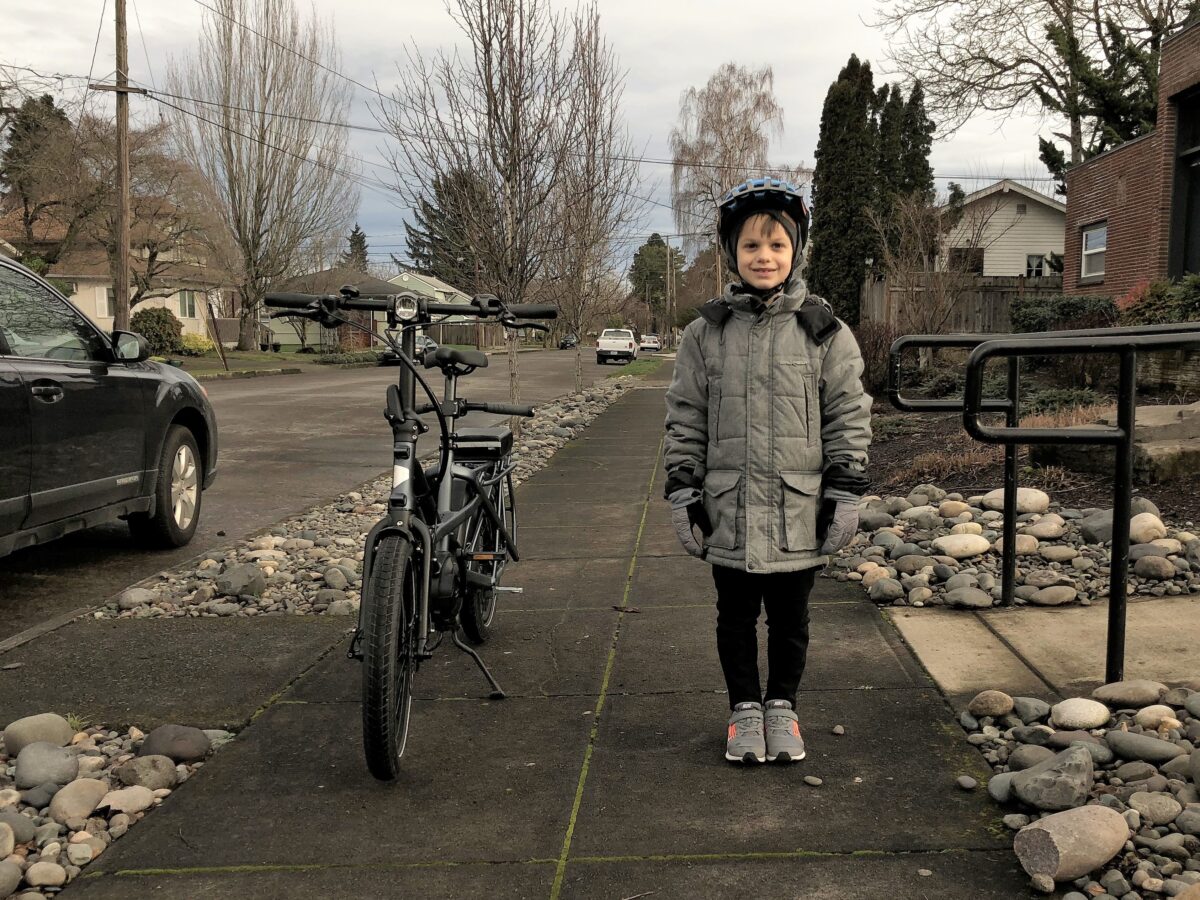
(Photos: Jonathan Kurten)
This week we’ll share a profile of the Kurten family.
Portlanders Jonathan and Tracy Kurten have been able to replace tricky transit trips and car trips with joyful bike trips — thanks in part to their useful new bikes.
I’ve been hearing lot of excited buzz in the family biking community about the relatively new Tern Bicycles GSD. They’re one of the few cargo bikes that fits riders short and tall, and they’re very compact. The GSD’s 20-inch wheels give it the same overall length of a regular bike; but it’s long enough to hold two kids in the back. Also, they fold! And they have a zippy mid-drive electric assist which makes them good car-replacements.
Learn more about how these bikes have helped the Kurten family go carfree below…
➤ Tell us about yourself and your family.
We’re Jonathan and Tracy Kurten, our kiddos are Julian and Judah. I moved from South Africa with my family in 2000 at which time we lived in South Dakota. Tracy and I met during high school and moved around the midwest for a few years. After a short time living back in South Africa, we decided to return to the US and intended to relocate to the west coast. We immediately fell in love with the valley and we’ve been living in the area for the last 7 years.
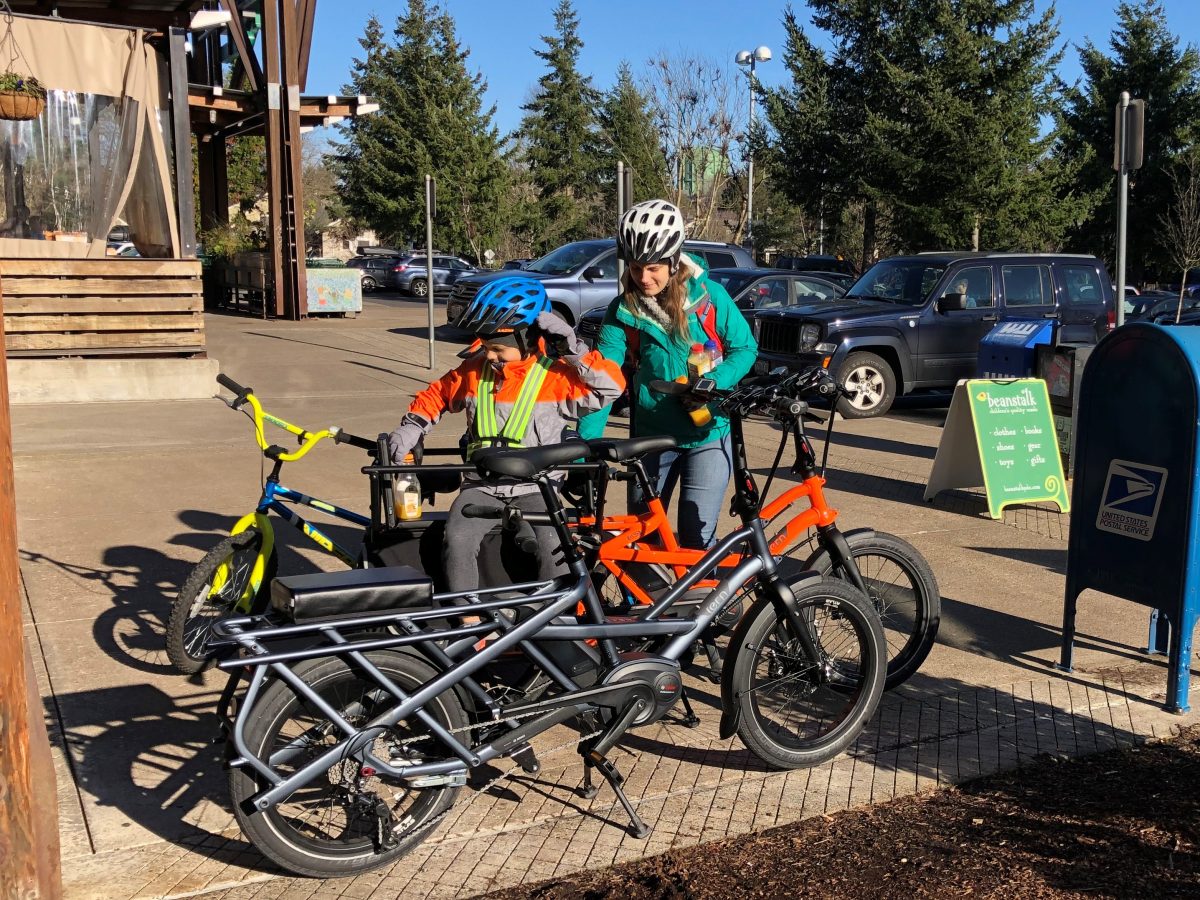
➤ Tell me about your bike.
We recently traded in our hybrid bikes for 2 Tern GSDs. The kids still each have a manual bike they ride from time to time, but they much prefer to cruise on the back of the GSDs. One GSD is set up with a clubhouse where both boys can ride and pannier bags for any kind of cargo. The other is equipped with sidekick bars and a seat pad for our older boy, when we’re traveling as a family and split the kids up.
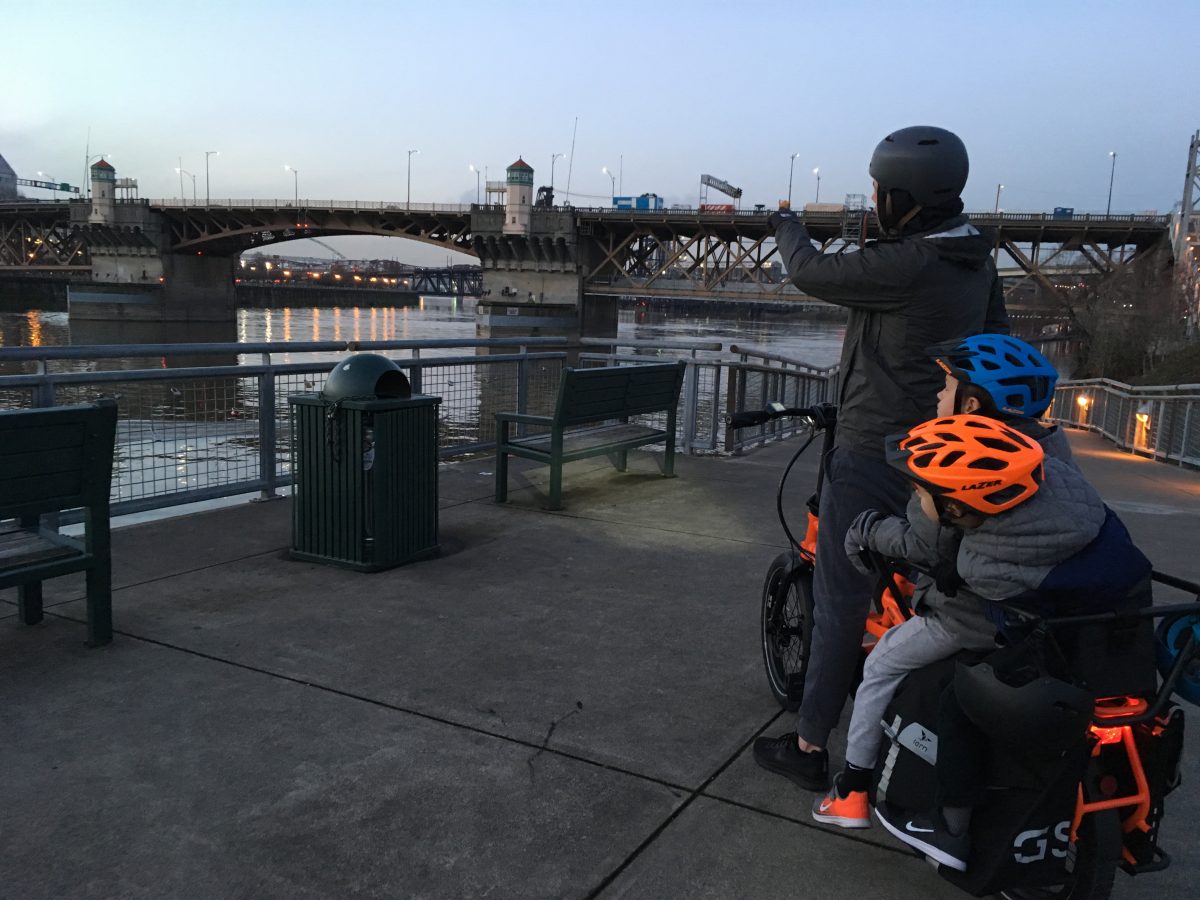
➤ Is there something you wish you had known before you took your first pedal stroke as a family biker that would have made things easier?
We’re pretty lucky in Portland to have a bike shop around every corner. Even so, it’s a true bummer to get a flat in the middle of running errands or heading to an appointment. We’ve learned to keep spare tubes and gear on hand, just in case! This is especially true if your bike has less common sized tires like our bikes do.
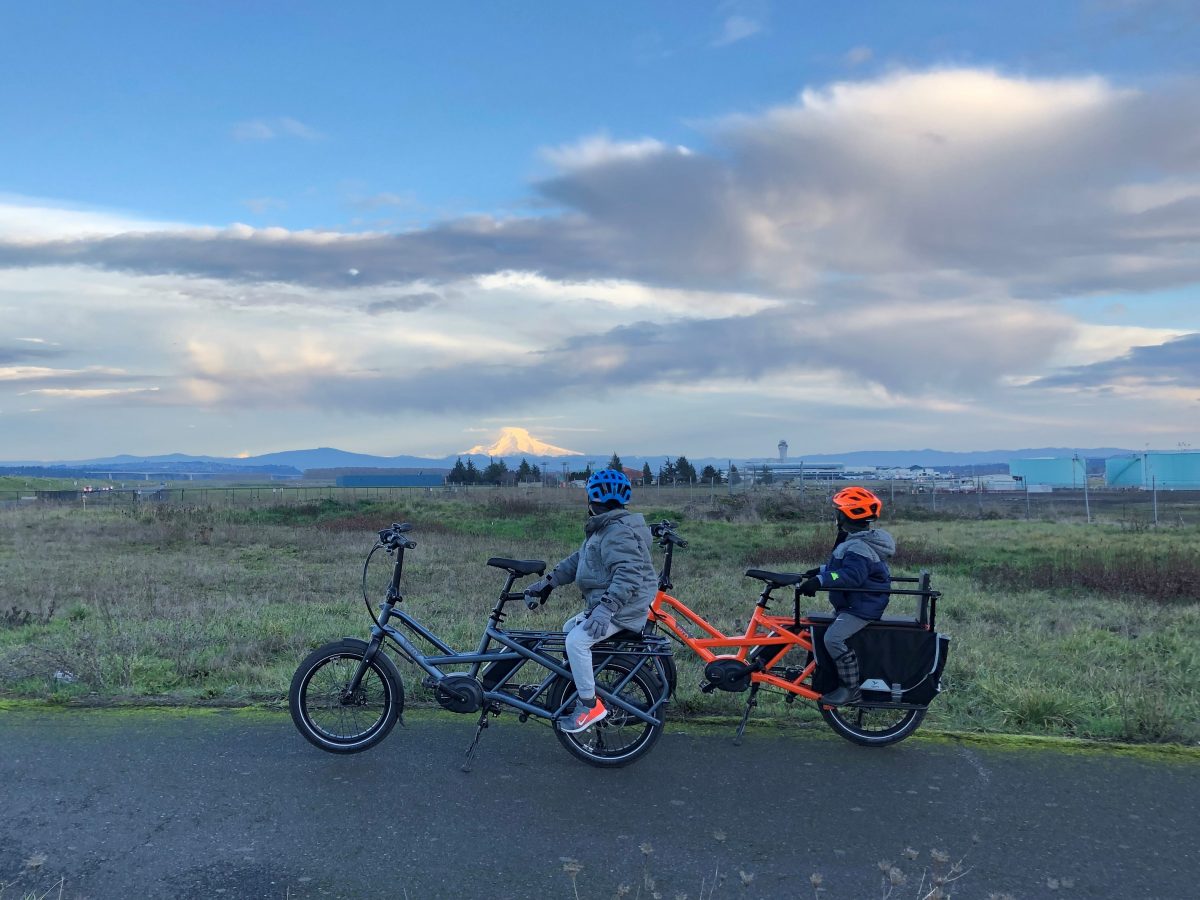
➤ Tell us about a typical trip you take on your bike.
I typically bike to work each day, weather permitting, to my office in Old Town. My route includes crossing the Broadway Bridge. We’re fairly close to the grocery store, meaning we mostly walk there, but typically make a trip with our bikes once a week to load up with larger items. Both of our boys are involved in soccer, which can mean trips to many different parks around Portland. This was a point of headache at times, timing the bus and walk time needed to arrive at the set time. Having our GSDs has allowed us the ability to pack the necessary equipment and kids and travel on our own time schedule, allowing us ease with both timing and effort.
Advertisement
➤ Tell us about an especially memorable ride in Portland.
We have some family that live in the southern neighborhoods of Portland and have typically only been able to reach them via car or by a long transit trip. Once we had the e-bikes we were able to bike all the way down to them via the Springwater Corridor. We didn’t even know this part of the city existed! We’ve talked at length at how excited we are to discover more nooks and crannies that one can really only discover by bike. Biking in the winter doesn’t always sound appealing, but we happened across many neighborhoods and streets with holiday light displays, which felt much more magical at a bike’s pace, and bundled up.
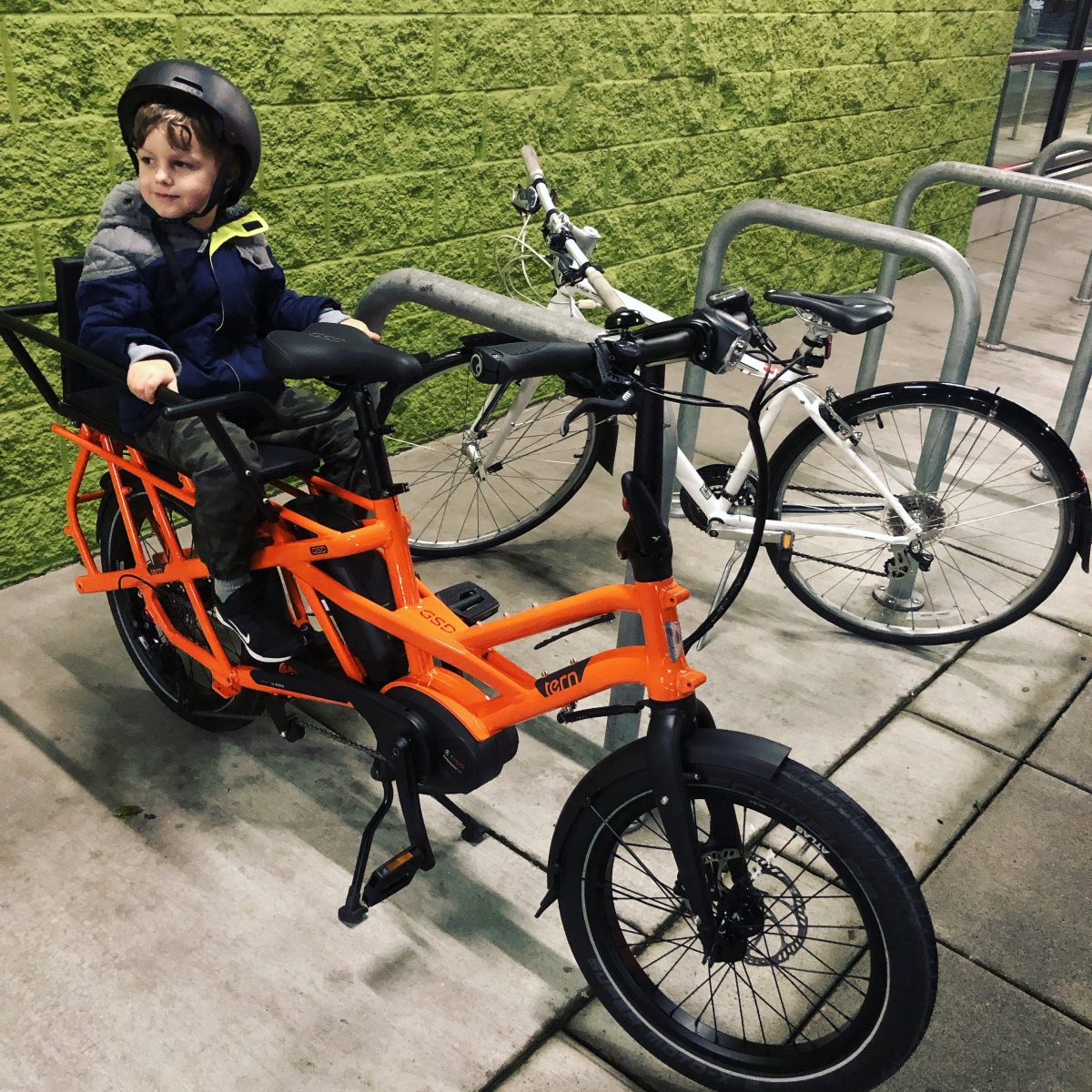
➤ If there was one piece of bike infrastructure (street, intersection, bike rack, etc) you use regularly that you could change to improve your life, what would it be?
More protected bike lanes! As a lone rider I typically feel pretty safe, but biking with my kids can be quite the stressful ordeal. The changes made over the last year to Rosa Parks are great. I hope the cities continue to make changes like these, giving cyclist and pedestrians priority over parked vehicles.
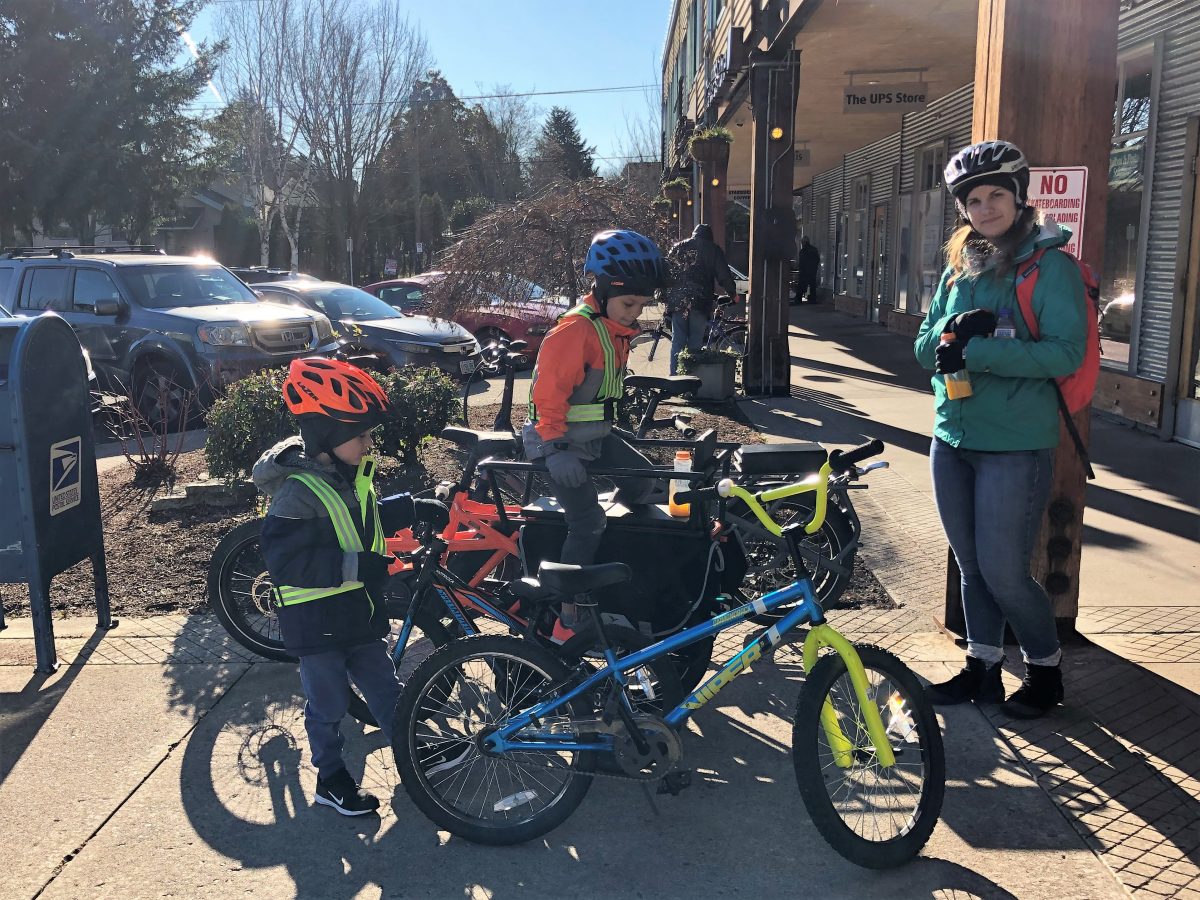
➤ Have you biked in other cities and how did it compare?
While we’ve always biked in towns and cities where we’ve lived, Portland has been the first city where I’ve felt comfortable enough to go carfree. Transit and micromobility options are vibrant enough here that this is becoming and more and more reachable as a possibility for residents.
➤ What about rain/snow/wind/extreme heat? Do you bike in less-than-ideal conditions?
Rain, yes. Snow, cautiously maybe? Wind, sure. Extreme heat, effortlessly with an e-bike.
➤ What’s your best piece of advice to pass along to BikePortland readers?
Challenge yourself to make biking your primary mode of transportation. You just might find it easier than you thought and you’ll almost certainly find that you start to see your city in a whole new way.
➤ Do you have a social media presence you’d like to share?
Feel free to follow me @JoKurten on Twitter.
Thank you for sharing your story Jonathan and Tracy.
Remember, we’re always looking for people to profile. Get in touch if it sounds like fun to you. I’d especially like to feature families of color so please get in touch or ask friends of color who bike with their kids if they’re interested in sharing their stories. And as always, feel free ask questions in the comments below or email me your story ideas and insights at madidotcom [at] gmail [dot] com.
— Madi Carlson, @familyride on Instagram and Twitter
Browse past Family Biking posts here.
Never miss a story. Sign-up for the daily BP Headlines email.
BikePortland needs your support.




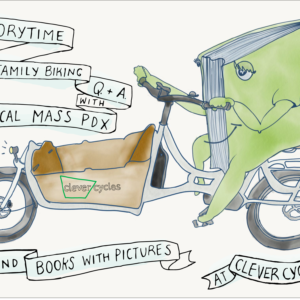

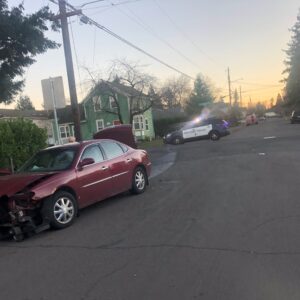

Thanks for reading.
BikePortland has served this community with independent community journalism since 2005. We rely on subscriptions from readers like you to survive. Your financial support is vital in keeping this valuable resource alive and well.
Please subscribe today to strengthen and expand our work.
Fantastic piece. Thank you. I’d love to see more profiles of carfree households!
(One in seven on average in closer in Multnomah Co., and I think one in two in a few census tracts sprinkled through the region.)
‘Biking’ on $10,000+ worth of electric mopeds. Outside the weight issues, its clear that those things are a bio-mechanical disaster, so I get that they must be motor driven to function.
For the average family, a used motorcycle would be vastly more practical and way more awesome. For me, I will stick to human powered conveyances.
I’d disagree with that. A motorbike, used or otherwise, will on the whole not be able to carry several children or nearly as much stuff as one of these can unless it’s quite large, and therefore intimidating for most people to ride. Plus you have to gas it up, fix it, oil it etc etc. You’re absolutely right that the GSD would be a disaster as a regular bike but that’s really not the point. E-assist makes this bike possible and if you can embrace that, it’s terrific.
Disclaimer: we have one of these, and I think it’s awesome (though I still ride my “human powered conveyance” when I don’t have an excuse to ride the GSD). Really well thought out and nicely built, and very fun to ride.
Electric Cargo Bicycles are nice but they are definitely a virtue signaling machine. Used gas scooters can be had for $400-$600 and accomplish the same purpose. Even though I agree with the virtues that electric bikes signal, I have to acknowledge that they are not a frugal or cost-effective choice.
My dumb principles will probably put me on a Big Dummy (unassisted) and I will likely use it less than an electric bike.
Except for the fact that E-bikes have no local emissions, while the majority of mopeds cheap motorcycles emit more harmful particulates than a car. If more families got around this way, our city would be cleaner and safer for everyone. This isn’t virtue signaling; it is virtue.
https://www.telegraph.co.uk/news/science/science-news/10834679/Scooters-pollute-more-than-lorries.html
Sure e-bikes are better than scooters…. but your key words here being “no local emissions” are interesting. Electric bikes, scooters and other vehicles are great for their lack of emissions ‘locally’. However, so many people seem to forget what it takes to create energy and that creating energy elsewhere has environmental impacts that are not as visible when they are riding their e-bikes; emissions in the form of coal power plants, hydroelectric dams limit fish passage to many miles of rivers for spawning, or wind turbines that can affect birds. Electric vehicles simply pass the local emissions impact onto other non-locals to worry about. Electric is not necessarily the answer.
All true, but e-bike trip to local shops beats 2 tonne car driving to shops to pick up 50lbs of groceries any day of the week (push bike / walk best of all of course, if you can get people to do it).
“if you can get people to do it…”
But this is the problem, isn’t it?
In our breathless celebration of e-, we have stopped celebrating, acknowledging, defending, pursuing human powered solutions. Plenty of folks are going to protest, saying: but we can do both! Except that in our society a pair of legs and a lithium battery are not equal; it is not a fair fight. In a capitalist system the sexy, ever-new product will always get more marketing, more R&D, fits more easily into the semiotic landscape, will win, over the timeworn metabolic alternative.
We are seeing this right now. Just look at how ever-new e-goodies are championed in these pages.
9watts, it was weird to see you indirectly praising these two new steel* e-bikes with a combined 2000 Whs of LITHIUM batteries when you also rail about the tiny Bird e-scooter batteries.
*far more embedded mining and resource use than the lithium batteries.
soren, it was weird to see you post underneath this comment. Did you read it? Have any comments?
But back to batteries, you are skipping over the utilitarian differences between the two. Groceries on a scooter? I guess I could be persuaded. But in any case this tale of getting by without a car strikes me as far more plausible, meaningful, genuine than the pull quotes from PBOT’s hapless survey of scooter users.
We are in a good position in that much of our electricity is renewable, so e-vehicles mean less pollution anywhere. And even where there is pollution, it’s better not to have it in a dense city where lots of people are exposed.
And besides, it’s not like if we didn’t have ebikes, we’d tear down the dams on the Columbia.
“We are in a good position in that much of our electricity is renewable”
We’ve debated this here before. ‘Much’ sounds like a carefully qualified statement. Large hydro is often bracketed, excluded from the renewable column because it is recognized to be so problematic. But more importantly, your blithe reassurance misrepresents the situation which is that we are already using all the kilowatt hours we produce for things other than transportation.
“so e-vehicles mean less pollution anywhere.”
Pollution accumulates throughout the lifecycle, not just with respect to the fuel emissions. To make any comparative statements we need to look at the full lifecycle, find ways to compare dissimilar varieties of pollution. But if we consider the broader spectrum of alternatives, not just gas vs battery-electric, then we might recall that human powered propulsion would be a lot better, involves no such tradeoffs, but increasing returns to scale, positive feedback.
“And even where there is pollution, it’s better not to have it in a dense city where lots of people are exposed.”
You could easily argue the opposite. By removing the sensible pollution from the awareness of those receiving the benefits, we may actually be undermining the prospects of reducing it.
“And besides, it’s not like if we didn’t have ebikes, we’d tear down the dams on the Columbia.”
You have that backwards.
(1) There *are* efforts to take out some of those dams;
(2) demand growth continues, so where is the new supply going to come from?
(3) if we switch from gas to electric propulsion, it will blow the lid off any local gains in the share of renewable electricity fed into the grid.
The efforts to remove dams are small dams that do much more damage in comparison to the benefits they provide. No one (that I’m aware of) has seriously proposed removing the big ones. New capacity is coming from wind and not coal. Electricity is far more efficient in terms of propelling vehicles that even if it was produced by burning gasoline, it would likely be a fairly big net gain.
Regardless, ebikes are not going to tip the balance in any direction. They won’t even be a blip on the charts, so hand wringing about them from an electricity consumption standpoint is an intellectual exercise.
Hydro is the textbook definition of renewable energy. Dams are bad for fish, wind turbines are bad for birds, etc. Oregon will be coal-free in a few years.
New hydro can be one of the worst forms of energy possible if one is concerned about green-house-gas-induced ecocide. Existing hydro is less bad but many of these sites are still releasing enormous amounts of methane which could be reduced by drying up dams.
OR will hardly be coal-free in a few years since much of its coal-generated electricity comes from out of state. Also, Boardman is being replaced with hundreds of megawatts of natural gas plants.
Oregon’s response to climate change is to essentially do nothing.
“9watts, I really don’t get your personal jihad”
I’m sorry you see this as a jihad. That doesn’t seem like the best way to frame my critiques, which I try to articulate more thoughtfully than what we normally take jihadists to do.
“against moving in the right direction if we don’t end up at the end goal at step one.”
Do we know the sequence? How do we know what comes next, or if e-mobility is a step toward that goal, which you haven’t articulated?
“If we could snap our fingers and take everyone driving and put them on an e-bike (none of them on human-powered bikes), we’d still see a giant-sized reduction in fossil fuel use.”
Lots of assumptions there. We should do some calculations. Like the calculation that shows that if we do exactly what your finger snapping suggests, but for fossil fuels (shift over to 100% renewables) as a whole, our CO2 emissions would go UP dramatically. I’ve elaborated on these astonishing but entirely plausible scenarios in the past. These are familiar but dangerously misguided techno-fantasies.
“…gasoline powered… monitoring fewer power sources …green-house emissions…. an enormous power-to-weight advantage to the e-bikes…”
I’m well versed in these matters, and don’t disagree with you on the technical points. Where we disagree is on the politics, the wishful thinking, the filter we seem determined to apply to any and all situation, which stipulates that the answer must flatter middle class consumer tastes with juicy products otherwise we’re not interested.
“And the world is moving in the right direction.”
I guess we’ll have to agree to disagree on this one.
I’m still not clear on what alternative you propose to “flattering middle class tastes” to encourage people to change their ways.
I’m pointing out that the frame is doomed, the belief (hope) that by running what is ultimately a political, moral question through are cheery, market-besotted blender we’re going to gain on the problem. The frothy efficiency shake tastes sweet but doesn’t satisfy our hunger for meaning, much less solve any of the underlying problems. It just postpones the day of reckoning, makes that day that much more painful because there will be that many more of us by then.
Just because market-compatible solutions like sexy lithium powered goodies appear to triumph over the tradeoffs our 39th President was uniquely predisposed to raise, doesn’t mean they do. We are so desperate for good news that we keep falling for hucksters.
So… no alternatives.
There are plenty; we are just determined to look in the wrong places.
What is wrong with bikes? The one that is already in the garage, with the flat tires?
Ivan Illich spelled this all out brilliantly forty years ago. He was right then, and he is arguably even more right today.
” And the world is moving in the right direction there.”
We are building more coal-fired plants than we ever have. We are moving in exactly the wrong direction.
https://www.france24.com/en/20181205-chinas-unbridled-export-coal-power-imperils-climate-goals
The shortest way I can think of to explain this is that when we typically think of investing in infrastructure we think of money being the constraint, but when we get to the point of wanting to seriously invest in renewables, ramp up to a full scale switch from our current energy system to renewables, it will be energy that will be in short supply, energy with which to build the renewable infrastructure you (and many others) hope and expect to succeed what we have now.
here is a brief explanation:
https://dothemath.ucsd.edu/2011/10/the-energy-trap/
Not only will the fossil fuel energy with which we can mine, refine, build, transport, commission the solar panels and wires and grid connections be dear, have plenty of other competing demands placed on it, the sum of those energy inputs (the embedded energy of that new ‘renewable’ infrastructure) will initially (and possibly for a very long time) be greater than the renewable energy harnessed. To understand this you need to model this over time, see:
https://beyondthisbriefanomaly.org/2016/04/07/what-is-the-potential-for-renewable-energy/
&
https://beyondthisbriefanomaly.org/2015/12/10/the-energy-costs-of-energy-transition-model-refinements-and-further-learning/
The embedded costs of renewables have been extensively modeled by climate scientists, power system experts, and economists. The idea that they are not accounted for in IPCC models (or the vast majority of published models) is incorrect. If anything, estimates of economic cost and ERoEI by the IPCC and EIA have proven to be overly conservative.
See Chapter 7 – Energy Systems of the IPCC AR5:
https://www.ipcc.ch/report/ar5/wg3/energy-systems/
“Electric vehicles simply pass the emissions on …”
Yes, but the emissions passed on by an electric cargo bike, even in the worst case to coal-fired power plants with vastly more sophisticated and effective emissions controls, are infinitesimal compared to the local emissions of a gas-powered scooter. An e-bike gets quite a few miles per kWh.
On the face of it, it may appear emissions are “simply” shifted elsewhere, but they’re also reduced by multiple orders of magnitude.
Virtue signaling? Is that not a put-down for somebody who just happens to have made a different choice than you?
Not everybody has $10000 or whatever these cost but if they had spent it on a used car there would be no comment in this or any other local forum. Instead of a car (that would get in their pockets regularly) they got two vehicles that meet their needs, can do two separate errands if their family requires that, and do not stink like some dirty old two stroke mess. Never need to be around any of those, thanks.
If you are on a gas scooter (like a Vespa) you cannot legally ride in bike lanes anymore. Unless you are wealthy enough to live wherever you want, the scale of US infrastructure *requires* e-bikes if you want to live car free. I rode twenty miles a day, just getting to and from work. Expecting families with children to do that with just their legs is charmingly naive.
“The scale of US infrastructure *requires* e-bikes if you want to live car free.”
Most people in the denser parts of Portland could live carfree, as their neighbors who are could tell them, but why would they? Driving is cheap. There is no across-the-board requirement. But for many the transport expectations are higher than they would be if we as a society embraced living carfree and adjusted ourselves to that. Jobs would be closer if so much of our urban infrastructure weren’t given over to accommodating the car.
“I rode twenty miles a day, just getting to and from work.”
That is impressive. I biked 12 mi each way to high school. But we shouldn’t give up on the prospect of human powered cycling because your commute is beyond what many would consider, here and now.
>>> Jobs would be closer if so much of our urban infrastructure weren’t given over to accommodating the car. <<<
Some, maybe, if they could afford the rent of moving into the urban core (which would be more expensive than it is today as more people vied for limited space), and that's where their employees and customers were. But many (Intel, as an example) would never be able to do so.
The idea that we could all just live and work inside I-205 is simply not realistic, and never will be.
“Some, maybe, if they could afford the rent of moving into the urban core (which would be more expensive than it is today as more people vied for limited space)”
This would be an interesting modeling exercise. Why would housing be more expensive, if the, what- 40%? of cities today that are devoted to the automobile were freed up for housing? Obviously with enough ingress, demographic pressure, all such plans would come to naught, but outside of that I could imagine housing costs could also fall.
Or we could specify that of the 40%(?) ‘newly available’ land a certain percentage had to be devoted to commerce, to jobs, etc. basically undoing some of the key (foolish) precepts of our approach to zoning.
There’s not going to be much “newly available” land in the urban core. It’s pretty much all been built on.
I thought we were talking about a thought experiment, a post-auto reallocation of the vast tracts of urban land now given over to the auto,
So… build office buildings in the parking strip? Or are you talking about razing everything and starting fresh?
It is a thought experiment. Let your imagination roam free.
I wasn’t for razing anything, but I’m sure smart folks somewhere have explored this matter.
Then let’s build a new city where there isn’t already one, and you can design it however you want without having to worry about any current constraints. That’s easier and more efficient than building atop an existing city, with it’s pesky infrastructure, existing buildings, and people getting in the way.
Never mind,
So you have kids and never drive them in a car? Maybe you should write an article on Bike Portland!
You keep challenging people here to prove that what you seem to find implausible—that Portland families manage to take care of their transportation needs without a motor—exists. I would like to see more column inches devoted to that subject, but your demands seem to come from a place of mistrust, of being more about showing people to be frauds rather than discovering what some of us already know. This seems unfortunate.
I’m merely turning the tables on the people who I suspect are child-free, and come here to criticize a family who is finding a way to make it work. Their critiques would look like more than sour-grapes if they shared personal experiences showing another way.
Let’s invite Madi to profile them here, before assuming they don’t exist, are frauds.
Disaster? Gas scooters & motorcycles produce far more pollution than even cars:
“Cycles created several hundred times more hydrocarbon pollution than cars. Hydrocarbons cause cancer, breathing and heart ailments, and contribute to smog.”
https://www.greencarreports.com/news/1067907_motorcycles-are-more-polluting-than-cars-new-device-shows
Enjoy being stuck in traffic on that moped! I’ll be the guy passing you in the bike lane on my e-bike… Tootles!
While this may be warranted scepticism for someone considering whether to get an e-bike or some other automobile alternative, it is counterproductive to the larger cause of reducing the quantity of cars on the road and the speed at which they drive.
Let’s agree that we should champion any vehicle using the road that slows car traffic and does not pollute our streets, whether all human powered or electric assisted.
I want to compliment the photographer on the elegant color matching in the first photo: railing, girl, bike, car, rocks… Slick.
Great profile. This family has made carfree look easy. Those two kids will know and love their city better than their peers, and they will have a great sense of adventure sparked in them.
It seems the electric equipment provided the additional “boost” that made the carfree lifestyle possible for this family. I wonder if other families will agree.
A popular personal finance blog proposes that if you can do a grocery trip on bike, you can do any trip by bike: (http://www.mrmoneymustache.com/2011/10/20/mmm-challenge-try-getting-your-groceries-with-a-bike-trailer/).
The mom is right to want more protected bike lanes. Separate high-speed traffic from the low-speed traffic. With a scarce resource (public roadways), engineering authorities should prioritize active transit over parked vehicles.
Thank you! Looking forward to the next profile.
What I like best about MMM is that he encourages and nudges but always seems reasonable and never harangues.
A similar taste in humor to yours.
Hm… perhaps MMM and H,K are in reality the same person?
I agree. There is a fair amount of ridicule and face-punching for people who are asking for it. But it’s all delivered with humor.
My acceptance of EBikes is situational. I can’t help but scoff at the healthy person who burns electrons to ride a one person bike from NW 23rd to the Pearl District , but this use of E Cargo bikes to live a car-free life with a family and kids gets my two thumbs up. Anything that takes another climate killing death machine off the streets is a good thing in my book.
More and more often I hear stories like this of electric bikes enabling people and families. These stories are nearly always met with someone making a condescending comment about how it electric bikes are not real bikes. These comments never seem to come from a place of personal experience, but rather from a place of judgement and a smug sense of superiority – in other words, the exact type of stereotyped behavior that people biking are often accused of.
If you want more people biking more and this is how you respond, you are doing it wrong.
E-bikes are tempting but my first question will alway be “How’s the ride with power off?” There’s nothing like riding a bike that’s well set up and running smoothly. This makes me think I should try dropping in a front wheel conversion–a little help getting a load up a hill, and nothing dragging on the drive train.
“…comment about how it electric bikes are not real bikes. …These comments never seem to come from a place of personal experience, but rather from a place of judgement and a smug sense of superiority.”
Some commenters seem to fit your characterization, but there is so much more to be said about this. It is possible to celebrate carfree families relying on e-bikes, while representing a critical stance toward e-transportation, and especially e-boosterism. Electric propulsion offers clear environmental advantages over internal combustion vehicles, but where some of us come in is that just because they are better than gas-powered vehicles (a rather low bar) doesn’t mean
(a) everyone could choose this route and all would be well,
(b) there are no environmental repercussions to e-propulsion, or that
(c) a focus on e-propulsion doesn’t reify the cultural notion that real transportation has a motor.
Given where we are with respect to climate change, lithium, inequality, cost it is essential that we recognize, and not shout down, discussions of the differential implications of scaling up human (no limits) and electric (all kinds of limits) transport. In a less worn out world we could just happily pursue and enjoy endless quantities of both, but that isn’t the world we live in.
Everything at 18% gray.
Leaving aside the environmental stuff, this made me sad: “The kids still each have a manual bike they ride from time to time, but they much prefer to cruise on the back of the GSDs.”
+1
Do you have kids? Do your kids bike with you everywhere?
Plenty do. What is your point?
They may love riding their bikes, but if they can cruise around on the back of a bike with their parents, they may prefer that sometimes. Especially if it is a longer distance or something.
Also, good grief, judging kids…
Judging kids?
Who is doing that?
Pat. Pat did.
That is not how I read it.
The only other possible reading is that Pat had a sudden onset of depression that happened to occur at the exact time they read that part of the article, but was somehow completely unrelated to the information they just read.
I am not inclined to speak for Pat, but let me offer an analogy that captures how I read the comment: I give my kid a screwdriver. Then one day I buy a cordless drill driver with brushless DC motor, built in light, keyless chuck, clutch, reverse, and multiple speeds. I always use that one when working on projects. Which is my kid likely going to grab, prefer, the manual screwdriver or the exciting gizmo that uses juice out of the wall socket to accomplish magical feats, and make a ferocious din?
This isn’t a judgment of the kid, but a wistful comment on the asymmetric choices we present to them. Do you see the difference?
I love seeing kids on their own bikes, but this didn’t hit me the same way as it did you. It’s winter! And those kids are little! I have a feeling they’ll want to ride more and more as the weather gets milder. As a parent, when my children were that size I much preferred getting to tote them around for speed, simplicity, and ease of conversations.
Madi, I really appreciate the articles you do on BP, it’s great to find out about real people doing real stuff with their families on bikes.
I think when we see people choosing to carry their kids on a big bike instead of everybody riding their little bikes it says more about the places they have to ride then it does about the parents or the kids. I don’t have children but I imagine it is damn hard to be brave, for yours kids. Hard to turn them loose.
These stories sound great if you ignore all the details: the family lives in an inner neighborhood near grocery stores, bike shops, etc. The work commute takes the father to Old Town, which is about as centrally located as one can get. The family has $10k to drop on fancy e-bikes rather than a financed minivan.
I just see privilege. So many Americans live paycheck-to-paycheck, scraping by. Are they the ones going “car free”? No, of course not. It’s the families that live comfortably, with an emergency fund and a safety net and room for error.
Most of the rabid pro-bike, anti-car comments are from privileged, upscale, in-town residents.
I was told by someone a few weeks ago that bikes equal privilege. I think this is bunk, but I see a coming social justice assault on cycling. Hope I’m wrong.
On differentiating among some of those terms: https://bikeportland.org/2015/05/12/travel-time-speed-data-shows-impact-powell-protest-143102#comment-6383182
I’m pro-car.
IMO, car-free folk in inner portland should be taxed at higher rates* in order to subsidize the car use of (car-dependent) people who have been displaced to and/or economically redlined into transportation deserts.
*a progressive saez-zucman-piketty wealth tax would be ideal, imo.
I’m with you — cars are awesome! They should be further subsidized!
My boss (who lives in the transportation desert of West Linn) would be happy with your proposal, whereas my (much) lower income friends living in the industrial area of inner SE might be less so.
If your goal is simply wealth-transfer, there are much less convoluted, more effective ways of doing it than subsidizing driving for part of the population.